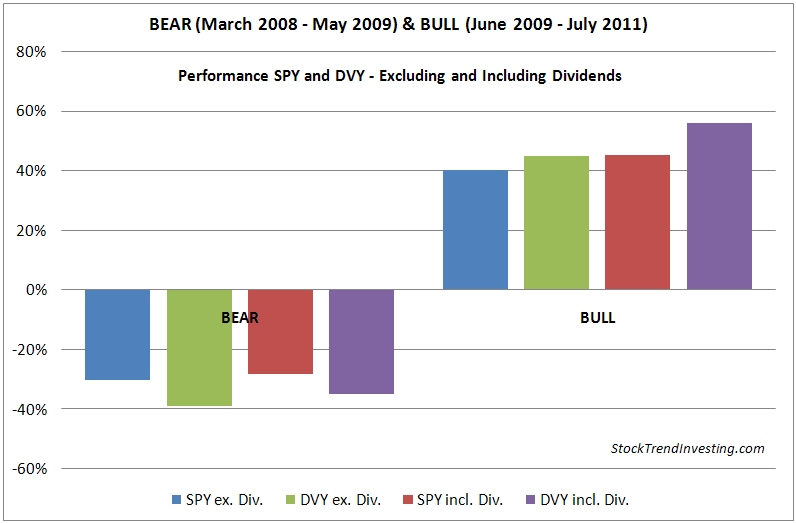High Dividend Funds during Bear and Bull Markets
Will High Dividend Funds outperform an index like the S&P 500 during bear markets, during bull markets or all the time?
In previous posts we have seen that dividends do matter. When comparing the performance of one fund with another, you would compare the total returns of the funds that include the dividends.
Just be aware of the following. To compare the price developments of different funds, many of us would use the information that is readily available at for example Yahoo Finance.
However, the prices that are shown in the graphs do not include the dividends that these funds have paid out of the course of the period that you consider. Some extra work is needed to make a comparison that includes dividends. We have done the work for you.
Comparing S&P 500 and Select Dividend Funds
To answer the question if high dividend funds would give you a better return than broad market index funds during bull or bear markets, we have investigated the following:
Bear Market
How does the SPY (S&P 500 Index fund) compare to the DVY (Dow Jones Select Dividend Index Fund) during the bear market from March 2008 till May 2009?
Bull Market
And how does this SPY compare to the DVY during the bull market from June 2009 till July 2011?
The chart above provides all the answers.
To show you the difference, we have compared the two funds both including and excluding dividends. By including the dividends, the difference in performance is clearer:
"During the Bear Market, the S&P 500 Index Fund did better the Select Dividend Index Fund, but both still lost considerable value."
"During the Bull Market, the Select Dividend Index Fund did better than the S&P 500 Index Fund… considerably better when the dividends are taken into account."
Lesson from Bull and Bear Market History
Can we conclude from this that the average index always outperforms the high dividend funds during bear markets? And that the high dividend funds will do better than the general index during bull markets?
No sorry… it is not that easy. As we have seen in a previous post, during the bull market period from December 2003 to March 2008, the SPY outperformed the DVY.
Why is there a different outcome during different bull markets? Here is a possible explanation.
The reason lays in the history. It has to do with how much the different funds lost in the bear market before the bull market and what the reason for that bear market was.
Dot.Com Collapse versus Financial Crisis
For example, before the 2003-2007 bull market, there was the 2001-2002 bear market. That was the collapse of the dot.com tech bubble. Now think about the following. Those tech companies, that lost sometimes 90% or more of their value, did not make any money. They probably did not pay any dividends. They were therefore not included in the DVY.
Thus the collapse of the tech bubble in 2001-2002 hit the S&P 500 Index Fund much harder than the Select Dividend Fund. And thus as a result, when the market bounced back between 2003 and 2007, the high dividend funds needed to re-bounce less than the average.
In comparison, the financial crisis in 2008 had a profound impact on both the SPY and DVY since it affected most companies and in particular dividend paying financials. Those financial companies dropped the most during the bear market and rebounded well during the following bull market.
Conclusions
What can we conclude from all of this?
- Number one is that trying to identify which stocks or group of stocks will do better than others is still not that easy.
- As a second, I would say that you would need to understand the nature of a specific bear market well before you can define a rationale if high dividend funds will outperform the general index or not.
- And as a third, you could draw the conclusion that before betting high dividend funds to outperform the general market index during a bull market, it is wise to look at how they did during the preceding bear market.
I hope that this analysis of how high dividend funds perform during bull and bear markets has been helpful to you and prevented any rash decisions. Please use the contact-form or the comment-form below to raise any questions and share your thoughts on this.
Next & Previous Blog Post
- ‹ previous
- 110 of 174
- next ›



